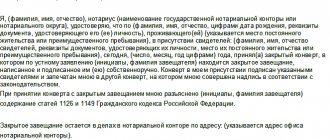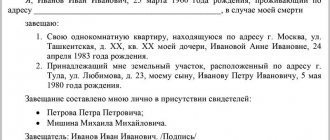People who own property (including real estate) often think about how to draw up a will without a notary so that it has legal force. This question arises when it is impossible to visit a notary’s office. The law provides that a citizen has the right to write an order without a notary certificate. But such paper has special requirements that must be taken into account. An incorrectly executed document can be easily challenged in court and declared invalid.
Why do you need a will?
A will is a written document that allows a person to legally determine how his or her property will be disposed of after death. The act of expression of will comes into effect after the opening of the inheritance. Issues of its writing and execution are regulated by the Civil Code.
If a will is not drawn up, then the property passes to the heirs in the manner prescribed by law. This means that they receive inherited property in equal shares according to the established order.
Ignoring the procedure for drawing up such an order can result in problems for the relatives of the deceased.
A will is drawn up for the purpose of:
- Determine the circle of persons (relatives or not) who will receive the inheritance after the death of the testator.
- Specify the list of property due to heirs.
- Establish the share of each of the applicants in the total inheritance.
- Outline the conditions for receiving an inheritance.
In general, the law requires mandatory notarization, otherwise the act of expression of will is considered invalid. The notary’s task is to verify the testator’s legal capacity and compliance of the terms of the document with Russian legislation. But there are exceptions. They arise in special conditions when it is necessary to ensure the exercise of the rights of a capable person to determine his will regarding the disposal of his property after death, and the opportunity to do this with the participation of a notary is limited.
Wills are divided:
- certified by a notary;
- equivalent to notarized;
- drawn up without the participation of a notary.
Fulfilling the requirements for drawing up a testamentary disposition will allow you to avoid troubles associated with recognition of its validity. You should learn in advance how to draw up a document correctly.
Who can be a testator
All individuals of social maturity can bequeath personal property. For this, a person must be:
- Adult. Minor citizens have the right to make a will from the moment of marriage or emancipation (declaring the minor legally competent). The latter is carried out by decision of the guardianship and trusteeship authorities for a child over 16 years old who works under an agreement, contract or is engaged in business.
- Capable. The legal basis for recognizing incapacity can only be a court decision. You can doubt a person’s capacity based on indirect signs (for example, incoherent speech, trembling of hands, obvious absurdity of the content of the document). If it turns out that a person, being legally capable, at the time of writing the act of expression of will was not able to control and regulate his actions, then the legality of the document can also be challenged.
Recognition of a citizen as incompetent or partially capable after the fact of making a will does not affect the result of assessing its validity.
Is it possible to make a will without a notary?
It is possible to write a will without a notary that will be legally valid in cases regulated in the Civil Code:
- When making closed testamentary dispositions. Closed wills are understood as wills that testators draw up personally without the presence of strangers in secrecy. They are drawn up in handwritten form; the use of printed media is not acceptable. Such a document in a single copy, sealed in an envelope, in the presence of two witnesses, is handed over to a notary for safekeeping. All responsibility for the correctness and literacy of the content falls on the testator.
- There is no notary at the testator's location. This situation is typical for small settlements where notary offices are not organized, as well as places of military service and prisons. The list includes vessels at sea and areas where exploration expeditions are being conducted.
- There is an increased threat to the life of the testator. Finding a person in the epicenter of natural disasters and military operations poses a serious risk. In such circumstances, it is possible to draw up papers without the participation of a notary.
- The physical capabilities of a citizen who wishes to make arrangements in the event of death are limited. A document drawn up while a person is in a medical institution, nursing home, or sanatorium has legal force.
- It is assumed that one or more bank deposits will be inherited. A testamentary disposition regarding the inheritance of funds is drawn up in the bank where they are deposited.
In the absence of a notary in the above circumstances, documents certified by authorized persons are considered legal.
Common Mistakes
It is important to understand that you need to choose the right certifier. A review of judicial practice allows us to identify typical errors. So, for example, documents certified by the attending physician cannot be equated to notarized wills , since the law clearly states that this can only be the chief physician or his deputy for medical matters.
The attending physician can sign the document only if he was on duty that day.
A typical mistake for hospitals is to have the person signing it participate in the drafting of the document, instead of the owner. The “Methodological Recommendations...” establishes the need for such cases to indicate on the document the reason why such a person is involved in the transaction.
This rule also applies to documents drawn up by doctors.
Wills certified by the head of the temporary detention center cannot be equated to notarized wills.
The person does not serve his sentence there, and therefore, the will-maker and the boss are not in the same legal relationship as implied by the law.
Often civilians living in the territory under his control turn to the commander of a military unit. He can certify the document only if there is no notary working in the same territory ; otherwise, the document will be invalid.
Let us recall that a will, equivalent to a notarized will, must be drawn up according to the general rules defined in Art. 1124-1125 Civil Code of the Russian Federation.
Drawing up a document with the participation of people replacing a notary must be strictly in accordance with the law. It should be clear from the document that this is a will, it must be dated and must reflect the will of the owner of the property. A will equivalent to a notarized will must be signed by the testator in the presence of eyewitnesses.
The absence of an eyewitness’s signature on the document will lead to the transaction being invalid , since this is an important condition for its preparation outside the walls of a notary’s office. But the transfer of a copy of the will by an official to the relevant notary is not grounds for invalidating the document.
Who can certify a will?
The norms of the Civil Code of the Russian Federation clearly list the entities that can certify wills. This gives acts of will a legitimate status.
Depending on the situation, the persons certifying the will are:
- heads of local government bodies, specialists of the compulsory health insurance service (CHI) - in settlements where there is no notary office;
- chief doctors, their deputies, performing duties under the relevant order, doctors on duty - in hospitals and other medical institutions;
- directors, doctors on duty - in boarding schools, nursing homes;
- captains - on Russian ships;
- commanders of military units;
- heads of places of serving sentences;
- heads of field bases and expeditions;
- authorized employees - in banking institutions;
- when drawing up an administrative act in force majeure conditions, it will be witnessed by two people chosen by the testator at random.
Documents certified by the listed entities will be valid if the testator was in the specified place at the time of their execution.
Making a will: what you need to know
Many people, when they hear the word “will,” immediately think of old people, which is fundamentally wrong. A will can be made at any age. Unfortunately, no one is safe from accidents. Therefore, sooner or later the question arises: how to dispose of your property in the event of death? After all, everything that was acquired through back-breaking labor will in any case be distributed among the heirs. But with a will, you decide who gets what property.
What is a will
A will is the disposition of property in the event of death <1>. The main purpose of a will is to determine the procedure for transferring all or part of the inherited property to certain persons. Those. When making a will, a person specifically states what and to whom he is going to leave after his death - this is the main difference between a will and inheritance by law.
Example A grandmother has a son and a grandson. At the same time, she owns an apartment and a dacha. If she does not write a will, then in the event of her death all property will pass to her son <2>. And in the will, the grandmother can, for example, indicate that she leaves the apartment to her grandson and the dacha to her son.
The will must be:
- personal. You cannot make a will through a representative or make one will for two people <3>;
- free. The principle of freedom of will is multifaceted. So, you can dispose of your property as you wish (and not only those that you already own, but also those that you can acquire in the future). You can disinherit without explanation. You can change and cancel your will <4>.
Note! You are not obligated to anyone, including a notary, to communicate and/or explain your decisions in the will. In this case, the notary is obliged to keep the will secret <5>;
- competent. Only a fully capable citizen can make a will. That is, one who is 18 years old (or 15 years old in the case of marriage, or 16 years old in the case of emancipation) and who is aware of his actions <6>.
Note! If potential recipients of the inheritance prove in court that the person was mentally ill at the time of drawing up the will, the document will lose legal force <7>. Therefore, before going to a notary, we advise you to undergo a psychiatric examination.
Regardless of the terms of the will, a portion of the inheritance is received by the obligatory heirs
Minor children, disabled parents, spouses and children have the right to the so-called obligatory share of the inheritance. It is 50% or more of the share of the inheritance that would be due to each of them if inherited by law <8>.
Note Disabled persons include age pensioners, disabled people of groups I, II and III <9>. Minor children are children under 18 years of age <10>.
To determine the size of the mandatory share, you need to calculate the legal share:
The cost of inherited property also includes household items <11>.
Example U Gripa V.P. I have a retired daughter and a niece. He owns an apartment and a dacha. Grip V.P. wants to write a will and indicate in it that he is leaving the apartment to his niece and the dacha to his daughter. The cost of an apartment with household items is 100,000 BYN. RUB, and dachas - 40,000 BYN. rub. That is, the cost of the inherited property is 140,000 BYN. rub. In the absence of a will, the retired daughter is the sole heir. This means that she would have received both an apartment and a dacha. The legal share is 140,000 BYN. rub. (140,000 BYN / 1 heir). In this regard, the obligatory share in this case is 70,000 BYN. rub. (140,000 BYN / 2). With such a will, the niece will have to pay Grip’s daughter V.P. 30000 Bel. rub. (70,000 BYN rubles - 40,000 BYN rubles (cost of the dacha)).
Only the court can reduce the size of the obligatory share <12>.
A will can be open or closed
The testator can write an open will himself or dictate it to a notary in the presence of a witness. The notary can familiarize yourself with the contents of the will and check that it complies with the law. After certification, the notary gives one copy of such a will to the citizen, and leaves the second copy in his archive <13>.
Note: An open will, at the request of the testator, can be signed by another citizen in the presence of a notary. In this case, the will will indicate the reason why the testator could not sign the will with his own hand. This may be due to physical disability, illness or illiteracy <14>.
The testator hands over the closed will to the notary in a sealed envelope in the presence of two witnesses who put their signatures on the envelope.
Note! The testator writes and signs the closed meeting in his own hand. If this rule is not observed, the will is invalid <15>.
The contents of a closed will remain a secret to the notary and witnesses. This is its main difference from an open will.
What to include in a will
The data included in the will can be presented in free form. But the law has two main requirements for the contents of a will:
1. The document should be filled out with special care, paying attention to the fact that all points of the document are clear, understandable and interpreted unambiguously <16>.
Note! If any data in the will has an ambiguous meaning, then its meaning may be disputed by the heirs. In this case, when making decisions, the court will proceed from the literal meaning of the words and expressions contained in the will <17>.
2. When bequeathed property is distributed among several persons, the will must clearly define to whom what is bequeathed and/or to what extent. You can do this in one of the following ways <18>:
- indicate specific things that pass to each heir;
— indicate the shares due to the heirs.
Note: The testator must not present documents confirming his rights to the bequeathed property when certifying the will <19>.
If the will is written by the testator, then it must contain confirmation that the testator wrote it personally and that he is familiar with the content of the Civil Code regarding the mandatory share <20>.
Notaries usually offer their own forms of wills. They may include the place and date of preparation, the name of the testator, the address of his place of residence, etc.
Example of a will:
| WILL City of Gomel, Republic of Belarus. Twenty-eighth of August two thousand and seventeen. I, Viktor Pavlovich Grip, living at the address: Gomel city, Zhukova street, building 40, apartment 34, make the following order with this will: 1) I bequeath the apartment owned by me, located at the address Gomel, Zhukova Street, building forty (40), apartment thirty-four (34), to Grip’s niece Elizaveta Pavlovna and Grip’s daughter Galina Viktorovna in the following shares: 70 percent – Grip Elizaveta Pavlovna, 30 percent – Grip Galina Viktorovna. 2) I bequeath the dacha that belongs to me, located at the address Gomel region, Sunichka Gardening Partnership, plot number two hundred and forty-five (245), to my daughter Galina Viktorovna Grip. Contents of articles, clause 5, art. 1041, paragraph 3 of Art. 1044, art. 1064 of the Civil Code of the Republic of Belarus was explained to me. This will is written and signed by me with my own hand in two copies. Testator ___(signature)________ V.P.Grip |
Conditions that should not be included in a will
In a will you cannot <21>:
- impose on the persons appointed heirs in the will the obligation, in turn, to dispose of the property bequeathed to them in a certain way in the event of their death;
- include in the will conditions for his behavior in order to receive the inheritance that are unlawful or impossible for the heir to fulfill due to objective reasons.
Where can I certify a will?
As a general rule, a will must be certified by a notary <22>. To have a will certified by a notary, you can contact any notary office (notary office) in Belarus, regardless of your place of residence.
Reference information for the Notary can be found on the website of the Belarusian Chamber of Notaries in the “Find a Notary” section.
In an area where there is no notary office (notary office), a citizen’s will can be certified by an authorized official of the local executive and administrative body. Outside Belarus, a will can be certified at diplomatic missions or consular offices of Belarus.
However, there are situations in life when a notary is physically unable to witness a person’s last will. In such cases, the “most important boss” can certify the will in front of witnesses. For example, the chief physician of a hospital can certify the will of a citizen being treated in this hospital, the commander of a military unit can certify the will of a serviceman, etc. But at the first opportunity, such a will must be transferred and certified by a notary in the notary office at the place of permanent residence of the testator <23>.
Note! Only notaries have the right to certify closed wills <24>.
Cost of probate
For notarization of a will and other actions of a notary, the following fee is charged <25>:
| Notarial action | Rate |
| Certification of the will | 0.5 BV - for pensioners and disabled people of groups I and II 1 BV - for other persons |
| Drawing up and preparing draft wills | 0.2 BV |
| Consultations on drawing up a will | 0.5 BV |
| Departure of a notary to the location of the testator (excluding transportation costs) | 0.5 BV |
The specified fee must be paid before contacting the notary <26>.
Reference information Payment can be made through the “Settlement” system (ERIP). Detailed instructions can be found on the website of the Belarusian Notary Chamber.
Who is present at the certification of the will?
In addition to the testator, in some cases, witnesses <27> must be present at the certification of the will:
- one - if you dictate the will to a notary;
- two - if you are certifying a closed will.
In addition, if the testator cannot sign the will himself, then the certificate must be taken by a citizen who will sign the will for him <28>.
In this case, the witness and the person who will sign the will instead of the testator cannot be <29>:
1) a notary or other person certifying the will;
2) the person in whose favor a will was drawn up or a testamentary refusal was made, the spouse of such a person, his children, parents, grandchildren and great-grandchildren;
3) heirs by will or law;
4) citizens who do not have full legal capacity;
5) illiterate;
6) persons with a criminal record for giving false testimony;
7) citizens with such physical disabilities that do not allow them to fully understand the essence of what is happening;
 persons who do not sufficiently speak the language, with the exception of cases where a closed will is accepted by a notary.
persons who do not sufficiently speak the language, with the exception of cases where a closed will is accepted by a notary.
A citizen who signs a will instead of the testator cannot simultaneously be a witness. Also, a witness cannot sign a will for the testator <30>.
What documents to bring to the certification of the will?
Depending on what kind of will you make (open or closed) and whether other persons will be present when the will is certified, the list of documents may be as follows <31>:
| Type of will | List of documents |
| Open, written by the testator | 1. Passport (a document that replaces it). 2. Two copies of a will written in your own hand. 3. Payment receipt |
| Open, recorded by a notary from the words of the testator | 1. Passport (document replacing it) of the testator. 2. Passport (document replacing it) of the witness. 3. When signing a will by another citizen - a passport (a document that replaces it) of this citizen. 4. Payment receipt |
| Closed | 1. Passport (document replacing it) of the testator. 2. Passports (documents replacing them) of two witnesses. 3. A personally written and signed will, sealed in an envelope. 4. Payment receipt |
To save time, before going to the notary, you can make an appointment with him. This can be done, for example, on the website of the regional notary chamber or in person. You can also invite a notary to your home.
Drawing up a will without a notary
When drawing up a will without notarization, no form is required. It is enough to adhere to the requirements:
- the document is drawn up manually or on a computer;
- the testator writes the text independently or his instructions are recorded by an authorized official;
- if the document is drawn up according to the words of the testator, then the latter must read it before signing;
- if the will-maker does not have the opportunity to personally read the text, then the official reads the document out loud.
The testator has the right to amend or cancel the act of expression of his will, drawn up without a notary.
Documents to be drawn up
To correctly draw up a testamentary disposition, the following is required:
- testator's identity card;
- list of subjects - intended successors of the inheritance estate.
The execution of wills without the participation and certification of notaries can be carried out in the absence of title documents for the property. It is enough to provide the wording in the text: “I bequeath all movable and immovable property that will belong to me on the day of death.”
When registering a document, you do not need to pay a state fee. Typically, material costs consist of the cost of notary services for its registration (from 1,000 rubles/page) and certification (from 100 rubles). Any attempt by authorized persons to collect fees is illegal.
Form
All such documents, in order for them to acquire legal force, must be in writing. This especially applies to the inheritance of real estate, apartments, securities, and cars. Personal belongings, household items, and small amounts of money can be transferred by verbal agreement.
Using a sample to write a will without the participation of a notary will help eliminate errors in the execution.
Compilation rules
In order to avoid conflict situations between successors, the type of will in question is drawn up according to the following mandatory rules:
- The document provides the necessary details.
- The text must be clearly formulated and reflect in detail the last will of the person.
- Errors and typos are not allowed.
The likelihood that a correctly executed document will not be recognized is low.
Content
Wills without notarization include:
- name of the document being drawn up;
- information about the place and date of registration (in words);
- in full - last name, first name, patronymic of the testator;
- accurate information about the composition of the inheritance mass;
- reliable information about the intended successors;
- number of issued copies;
- a record that the document was drawn up personally by the testator without coercion;
- signatures of the testator, witness and two witnesses.
The execution of wills for apartments without notary services does not differ in form and the presence of mandatory details from will documents regarding other valuable property. There must be information about the exact address of the property, its area and the number of rooms to be inherited. Indicate what part of the property goes to each of the receivers.
Special cases
There are situations in which a special procedure is required for drawing up and authenticating a document containing a person’s last will. These include life-critical situations and the management of money stored in a bank account.
Bequest of funds deposited in a bank
To express the will regarding the inheritance of money stored in the bank, the testator should draw up an order in the branch where the deposit(s) was opened. The bank is obliged to accept wills free of charge.
A document drawn up at a bank institution will have legal force if it is drawn up and certified in the following way:
- the will is drawn up in two copies, each of which is signed by the testator and an authorized bank employee, certified by their seal;
- The order is certified only by the representative of the bank who has the rights to accept for execution the client’s will in relation to the funds in his account;
- one of the copies is transferred to the testator of the funds, the second is registered in the Book of Testamentary Dispositions and filed in a folder for storage.
If the will in the bank is drawn up correctly, it acquires the force of a notarized document.
Will in critical situations
Registration of the last expression of will of people who are in the epicenter of force majeure situations must occur upon fulfillment of the requirements noted in Article 1129 of the Civil Code of the Russian Federation:
- The text of the document is written by hand;
- The registration procedure is carried out in the presence of two witnesses.
If the testator survived in the conditions under consideration, then he needs to notarize the written order within 30 days after its end. Otherwise it is considered invalid.
What wills are equivalent to notarized wills?
Article 1127 of the Civil Code of the Russian Federation and comments to it define 5 types of wills that are equivalent to certified ones. The testator draws up such an act in person with the obligatory presence of witnesses, as well as authorized persons of the witnesses.
Wills equivalent to those certified by a notary:
- compiled while staying at a hospital inpatient facility, as well as in a nursing home: certified by the head physician, manager, deputy, doctor on duty;
- when sailing on a ship of the Russian Federation: certified by the captain;
- expeditions for various purposes: signed by the leader;
- a military person or a civilian located in a military unit: certified by its commander;
- convicts serving a sentence: signed by the head of the correctional institution.
A testamentary document executed in one of the indicated ways is signed in the presence of a certifying representative, a witness and a witness. At the earliest opportunity, the certifier submits the document to the notary authorities. Optimally - preferably at the place of residence of the testator.
In accordance with Art. 1127 of the Civil Code of the Russian Federation, the following documents cannot be certified by the listed methods:
- inheritance agreement;
- joint testamentary disposition of the spouses.
If the testator expresses a desire to invite a notary to certify his will, then the authorized person, if possible, is obliged to do this.
Certificate
Who can certify wills? As a general rule, this can be done by a notary.
Reference. The procedure for certifying a document by a notary is described in detail in the “Methodological Recommendations for Certifying Wills...”, approved by the Decision of the FPN Board dated 01-02.07.2004.
The document describes the procedure in detail, clarifies the notary's obligation to explain the rights to the applicant and verify the legality of the transaction.
However, in addition to this official, there are others who have the right to certify the document. They must comply with the rules for its registration, the secrecy of the expression of will and transfer information to the general register.
In accordance with paragraph 7 of Art. 1125 of the Civil Code of the Russian Federation, notarized wills include wills certified by officials of the municipal administration or consular office in territories where there is no notary.
The possibility of transferring notary rights to these officials is also provided for in Art. 1 and 37 Fundamentals of legislation on notaries, approved by the Supreme Council of the Russian Federation No. 4462-1 of 02/11/1993, as well as in Art. 14.1 of the Law of the Russian Federation “On the General Principles of the Organization of Local Self-Government”.
If there is a bequest of funds stored in a credit institution, then the declaration of will on the appointment of a legal successor can be left directly at the bank.
Notarized wills include wills of deposits certified by persons who are bank employees.
The rules for drawing up such documents are enshrined in Decree of the Government of the Russian Federation No. 351 of May 27, 2002. The normative act also specifies the requirements for wills established by the Civil Code of the Russian Federation, namely:
- the right of the testator to cancel or change the testamentary disposition is stipulated;
- the need for written form is established;
- attention is focused on the need to maintain the secrecy of expression of will;
- the procedure for legal successors has been determined.
Persons equivalent to a notary
Wills certified by other persons are valid. Let’s make a reservation right away that they must be signed by the will-maker personally in the presence of the certifier and the witness. As soon as possible, the document must be forwarded to a notary working in the territory where the testator is registered.
or doctors on duty have the right to certify Medical organizations include not only hospitals and clinics, but also homes for the disabled or the elderly.
With regard to documents written by any person traveling on long-distance vessels, their captains have the right to authenticate them.
Leaders of long-distance expeditions also have this right. We are talking about any long-distance and long expeditions: reconnaissance, Antarctic or Arctic.
Notarized wills include wills certified by the commander of a military unit .
He certifies documents of military personnel, civilians working in the territory of a unit where there is no notary, and all relatives of these people living in this territory together with them.
The head of the prison certifies the documents of the prisoners.
Moreover, if it is possible to have a document certified by a notary, the above-listed will-holders have the right to contact him, and not the designated people.
Entry into inheritance under an uncertified will
A testamentary disposition not certified by a notary or authorized persons has legal force in the case where the execution took place in extreme, life-threatening circumstances (military actions or natural disasters) in which the death of the testator occurred. Entry into inheritance under such an act can take place in one of the following ways:
- without a trial, when all heirs agree with the will of the deceased;
- through a lawsuit if the heirs have doubts about the authenticity of the document.
In case of a controversial situation, the heirs must prove the following facts in court:
- when writing a testamentary disposition, there were extraordinary conditions that limited the opportunity to resort to the services of a notary;
- the testator personally wrote the will without any pressure on him.
In the future, entry into inheritance by testamentary disposition, the authenticity of which has been confirmed in court, occurs on a general basis.
In all other conditions, except those considered, a document drawn up in handwritten form and not notarized has no legal force.
Who else can it be certified by?
We are accustomed to the fact that all transactions require identification. On the one hand, this is correct, because a notary is the person who is responsible for registering transactions , entering them into the register, and also controls their implementation.
But on the other hand, a notarial transaction is nothing more than a necessity, as well as a kind of certainty. It is not at all necessary to have the transaction certified by a notary. You can contact other persons if you are unable to appear at the notary's office.
The heads of organizations have the authority to certify such transactions. In a situation where there is no notary office in your place of residence or location, you can contact this person. The following have exactly the same rights:
- head of the colony;
- commander-in-chief;
- submarine captain;
- expedition leader;
- chief physician
All these people are endowed with the right to carry out such transactions, and most importantly, to certify them, that is, to give them legal force.
Period of validity of the declaration of will
A properly executed testamentary instrument becomes valid after the death of the testator. The following time characteristics are important for its implementation:
- The heir, within 6 months from the day following the day of death of the testator, may decide to enter into the inheritance or refuse it.
- If the six-month period is missed for valid reasons, the heir can restore it within 3 years. This period is counted from the moment when the heir no longer has a reason preventing him from assuming inheritance rights earlier.
The last will of the deceased, drawn up in the form of a will, including without its certification by a notary, has no limitation on the validity period.
General provisions
Every adult capable citizen has the right to dispose of property as he sees fit. Including deciding who should have it after his death. The main thing is that the will of the testator is voluntary, and he is aware of the meaning of his actions.
The only requirement for the testator is his full legal capacity at the time of signing the document. No other restrictions (for example, imprisonment by a court decision) are an obstacle to the disposal of property. A will can specify one or more heirs. However, drawing up a collective will is not allowed - only one person can be the author of the document. It is also possible to draw up a joint will.
If two or more persons are indicated in the will, and the testator has not expressed his will regarding the shares going to them, the property is divided in equal proportions.
Expert commentary
Kireev Maxim
Lawyer
When a will is drawn up without the participation of a notary, it must be handwritten by the testator personally. A document printed in any way (on a typewriter or on a printer) has no legal force. It is also not allowed to make a will through a representative.
Challenging a self-executed will
A will, regardless of whether it was drawn up independently or with the participation of a notary, can be challenged. If citizens believe that there are grounds to recognize a document reflecting a person’s will as invalid, they have the right to go to court to provide evidence of this point of view.
Grounds for challenge
A self-executed document reflecting the wishes of the will-maker who has died can be challenged:
- according to the circumstances under which the testamentary disposition was drawn up and certified (for example, if the opportunity to contact a notary was not used);
- essentially - controversial positions in the text regarding the size and share of inherited property, the exclusion of someone from the number of heirs, and more.
It may be necessary to prove the fact that the person freely expressed his will in the will.
Declaration illegal
If during the trial in court a decision is made to accept the evidence provided by the plaintiffs, then the act of expression of will drawn up without the participation of a notary is considered illegitimate. In the future, the procedure for inheriting the property of a deceased citizen occurs according to the law. Judicial practice shows: despite the fact that a will that is not notarized has legal force, the heirs are forced to go through legal proceedings.
A capable and adult person is entitled to draw up a will by hand without a notary in some situations regulated by the Civil Code of the Russian Federation.
A circle of persons has been determined who, under specific circumstances, may have the authority to act as witnesses and witnesses to this act of expression of will. Strict adherence to the rules regulated by law will avoid mistakes and eliminate the possibility of challenging it in court. Order a free legal consultation
Extraordinary circumstances
A will without a notary is valid if it is drawn up in emergency conditions. The legislation does not stipulate which situations are considered emergencies. But experience has determined that these are special cases in which a person cannot come to a professional, and his life and health are in danger.
The reasons for such situations are not taken into account; attention is paid only to the presence of a problem and to the freedom of action of the testator (if he was forced to draw up a document, the court will invalidate it). A will without a notary is valid for only a month. If the person managed to survive, then he needs to go to a notary and have the paper certified, otherwise the order will be cancelled.
If a citizen has died, then the validity of the will is defended by the heirs of the deceased. To do this, you will have to prove the presence of emergency conditions that did not allow the deceased to contact the authorized service. The document must be drawn up only at your own request without outside pressure, which must also be confirmed.
If the judge recognizes the will of the testator as valid, then the division of property begins in the manner specified in the will. When the authenticity of the order is not proven, the assets are distributed according to the law.







